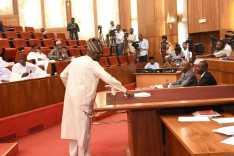
The vice chairman of the Senate committee on solid minerals, Senator Adesoji Akanbi, has advised the federal government on how to tackle the economic recession currently ravaging Nigeria. Senator Adeosji tabling a document before the leadership of the Senate recently. Akanbi, 54, is a former financial analyst and stock broker whose wealth of experience in economic issues is not in doubt. The lawmaker representing Oyo South Senatorial district, in an interview with Daily Sun, suggested a 13-point antidote President Muhammadu Buhari can apply to reinvigorate the economy. Read his recommendations below: 1. The federal government should, as a matter of urgency, bring all the aggrieved groups in the South-south of the country to the negotiation table whereby all their genuine agitations can be addressed because Nigeria as a country currently in recession cannot continue to lose millions of barrels of oil daily as a result of their incessant bombings of our oil installations in the region. 2. In a country where we are spending less than 30 per cent of our income on capital expenditure and more than 70 per cent on recurrent expenditure, getting out of recession will hardly be quick. The executive, judiciary and the legislature must be ready to make sacrifice and even our executive governors in various states must be ready to do away with their security votes and if need be, they have to be transparent about it. A country like Ethiopia as at now has reached a level where 60 per cent of her income is being spent on capital expenditure and 40 per cent on recurrent expenditure. This should be the ultimate target of this present administration. 3. Despite increase in our debt profile, it is still believed that Nigeria can borrow from the International financial institutions and use it to reflate the economy by quickly taking the advantage of the credibility of President Muhamadu Buhari which is a good leverage because some international financial institutions are ready to lend us money for infrastructural development. 4. The current administration should reduce local borrowing in order not to be in competition with the private sector because the banks prefer to lend money to the government than the private sector and that will further run down our economy. 5. Nigeria spent N630 billion to import food items and beverages. This shows our taste for foreign products which must stop at this point, and all of us have a role to play by patronizing made-in-Nigeria goods. 6. More still needs to be done to encourage our existing farmers and make farming more attractive to young graduates. We have the ability and capability to feed ourselves at a very reduced cost but the government has to play more roles in the area of providing transportation of farm produce to various markets at low cost. Government should put some palliative measures in place in this area. However, outright banning of imported food items is not the real solution but this can be best done by placing high tariff on them to discourage importers and consumers. The Nigerian Customs Service has to play its statutory role by manning our porous borders efficiently so as to prevent the smugglers from getting those banned products to our various markets. 7. Nigeria refineries must be put in good working condition because Nigeria cannot continue to spend over 50 per cent of her forex-earning mainly from sales of crude oil to import back petroleum by-products for our local consumption. We are left with very little foreign exchange which is not adequate to support our manufacturing sector in the areas of machinery parts and raw materials procurement that will enable our industry to operate at maximum capacity which will create jobs for our teeming unemployed youths. 8. We need to look inward to generate more revenue by widening our tax nets. In this kind of economy, people should not be over-taxed but there are still spaces where we can improve on our tax revenue. Our Value Added Tax (VAT) has been 5 per cent since introduction of VAT for over 23 years ago and VAT is mainly on luxury goods. It should be reviewed upward. 9. Treasury Single Account (TSA) is a good idea and it has helped to curb corruption in the system but the federal government has to ensure that much money is not kept idle in the Central Bank of Nigeria (CBN). A situation where large amounts of money are being deposited in the CBN without making any positive impact on our economy should be reviewed and such money should be used to support our Small and Medium-sized Enterprises (SME) to the fullest. Without supporting SME, we will continue to have high rate of unemployment. 10. Diversification of Nigeria economy at this point should no longer be a slogan as it used to be. Rather all our energies should be concentrated on how to indeed diversify our economy. We have abundant mineral resources untapped all over the country in commercial quantities and most importantly our laws and policies need to be reviewed to attract foreign investors that will invest in our solid minerals sector in particular. But looking at this year’s budget, I doubt that this present government is serious with the idea of diversification with regard to solid minerals development. The sector received a lean budget. This sector needs huge amount of money to be invested in the area of geological survey and all other useful data and information that can always be available for interested investors before it can generate substantial revenue for the government in the long run. The new development in Ajaokuta Steel Industry is good news and also a positive development towards sustainable growth. 11. The federal government should dwell much on infrastructure concessioning e.g. our four major airports in this country are not generating enough revenue for the government and this can be improved upon through concessioning arrangement. Some of these infrastructures can be upgraded to world-class standard. Instead of embarking on sale of our national assets, the government should embrace concessioning idea. 12. The palliative measure by the present government should take off immediately and all the bureaucracy bottlenecks should be eliminated with immediate effect, so people can enjoy the benefits – the sooner the better. 13. The economic team needs to be proactive and our monetary and fiscal policy should complement each other and the interest rate should be reviewed further down. A situation whereby the minister of finance and CBN governor are contradicting each other will erode little confidence left in the economy and that will not help our economy to grow. Created at 2017-04-18 07:20:33







This post has no comments - be the first one!